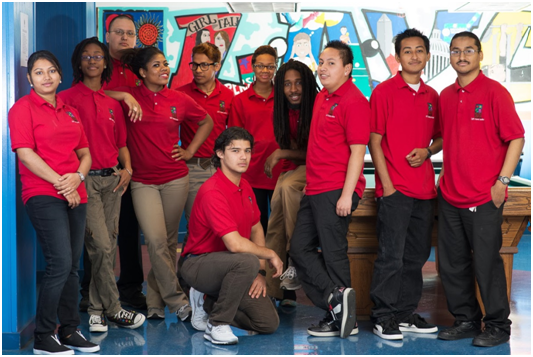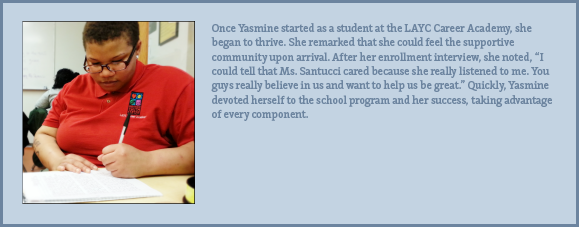
The LAYC Career Academy (LAYCCA) is a new school model that provides a bridge between high school and college for youth ages 16 to 24 in the District of Columbia. LAYCCA provides youth with college credits, AP-style classes, a rigorous and self-paced GED program, a college preparatory curriculum and career training in the health care and information technology (IT) fields. This school is the first in the District of Columbia to receive unconditional approval from the DC Public Charter School Board and the first GED school in the country to obtain a grant from the Walton Family Foundation, a foundation known for its dedication to high-quality college preparatory models.

The LAYC Career Academy was founded in response to an overwhelming need in the local community. In Washington, DC:
- Roughly half of public school students do not graduate from high school (DCPS, 2011)
- Only 9 percent of incoming ninth graders can expect to graduate from college on time (DC College Access Program, 2006)
- More than one-third of adults are functionally illiterate (ETS, 2007)
- Forty percent of 16 to 24-year-old DC residents are not in college and are unemployed (KIDS COUNT Data Center, 2014)
- Seventy-one percent of all jobs will require some post-secondary training beyond high school by 2018 (Georgetown University Center on Education and the Workforce, 2010)
The LAYC Career Academy was founded by the Latin American Youth Center (LAYC), a 45-year-old, award-winning, nationally recognized multi-service agency that empowers nearly 4,000 diverse youth annually in the national capital region to reach their social, academic and career goals. Leaders at LAYC had seen too many youth leave high school before graduation while others graduated from high school without being truly prepared for college or a strong career. LAYC founded the LAYCCA, its fourth charter school, to help young people take college classes, prepare for high-growth careers and finish high school in a supportive, youth-friendly environment.
LAYC Career Academy PCS opened in the fall of 2012 with 100 students. Of these, 70 percent were over the age of 19, 35 percent were pregnant or parents, 20 percent were nonnative-born students, 12 percent were homeless or in foster care and 8 percent were formerly incarcerated or currently in the adjudication system. Sixty-five percent of students were African American, and 35 percent were Latino. In its inaugural year, LAYCCA realized tremendous initial results. LAYCCA students’ performance on the NWEA MAP exam stands as a highlight: 40 percent and 68 percent of students gained double the national average in math and reading, respectively.

Innovation: Four Unique Components
LAYC developed the Career Academy around four complementary innovations spanning from curriculum development to the selection of our target population.
1. Outreach to Opportunity Youth: There are over 10,000 young people, ages 16–24, in the District of Columbia who are not in school and not working. Many of these “opportunity youth” have not finished high school, have aged out of the traditional K-12 system and have few options for finishing their high school credential. Those who have finished high school lack access to the resources they need to succeed in college or maintain employment. LAYCCA directly targets these youth, filling gaps in both interest and fit left by other institutions.
2. Competency-based Curriculum: At LAYCCA, students do not graduate in a set four-year period but rather complete the program when they can demonstrate that they have met all graduation requirements. Learning is self-paced, so that students don’t feel stigmatized if they progress more slowly or quickly than their peers. This also ensures that students who graduate are truly college-ready because they have proven that they meet the school’s demanding graduation requirements. To complete the program, students need to obtain a high school credential, a college-ready score on standardized tests and at least six college credits and/or an industry-recognized credential in IT or health care.
3. Career Preparation: LAYCCA helps students gain industry-recognized credentials in IT and health care that lead to good jobs. Those interested in IT earn A+ certification to prepare for entry-level help desk positions that start at $40,000. Those interested in health care are trained as medical assistants with starting salaries of $35,000 or more. These are two of the fastest-growing occupations in the metro area. This training and our job placement services allow students to earn a good salary that can help finance a college education.
4. College Classes: LAYCCA students take college classes on college campuses while still working on their GEDs. This early college model allows students to earn college credits free of charge and to gain confidence in their ability to succeed on a college campus. Students in early college programs have been shown to have better attendance and college enrollment rates than their peers (Jobs for the Future, 2009). Academic rigor, combined with the opportunity to save time and money, is a powerful motivator for students. Also, because students are dually enrolled in college courses while continuing at LAYCCA, they receive necessary support in what can be a very intimidating arena for many first-time college students.
Living in the Market
One of the most remarkable aspects of this innovative model is not only how tailored the program is to the unique needs of opportunity youth but also how adaptive the program is to meet students where they are at every step along the way. This approach embodies one of the core insights that Community Wealth Partners, an organization that allies with social change agents to tackle social problems at the magnitude they exist, has gleaned from its research on transformative social solutions.
Through an in-depth review of efforts ranging from the anti-malaria and anti-tobacco movements to the designated driver campaign and the reduction in crime in New York City in the 90s, Community Wealth Partners found that organizations “living in the market” through constituent-centered program design and adaptation based on changes in the external environment are better positioned to solve social problems at their true magnitudes (Community Wealth Partners, n.d.). LAYCCA does both, and is already demonstrating a strong impact on its students.
Student-Centered Design and Adaptation
After the skill levels of the diverse student body are assessed, specific courses are developed each trimester that reflect the exact academic needs of our population. Math courses vary from basic to calculus. Language courses range from beginning reading to college essay writing. Career pathway (IT and health care) courses scaffold their offerings to reach students at every level. Instructors continuously adapt their lessons to cover the educational arc of students who have interrupted educational experiences. Advanced students complete internships to gain practical knowledge in IT or health care.
Many studies have shown that it takes much more than academic achievement to guarantee the best possibility for success in academia. To this end, LAYCCA’s Student Support Department develops non-cognitive skills to cultivate tenacity and persistence through barriers. The skills are best delivered through Breakthrough Courses, which teach coping skills and empower students to use their past as motivators towards success. Student supports include assistance in applying to college, subsidies for transportation and uniforms (when such costs are burdensome), on-site barber services and eye examinations and workshops in resume development and job procurement.

Initial Outcomes
In its inaugural year, LAYCCA has accomplished the following:
- Forty percent of students gained double the national average in math on the NWEA MAP exam, a nationally recognized assessment tool
- Sixty-eight percent of students gained double the national average in reading on the NWEA MAP exam
Career and College Achievements:
- Four students earned A+ certifications.
- Sixteen students received IC3 certifications.
- Eight students participated in internships at local businesses and clinics in the IT and medical assistant pathways. Companies reported great satisfaction with the students’ efforts, even discussing hiring options at the conclusion of the internships.
- Eight students earned college credits in humanities, mathematics, sociology or history courses from the University of the District of Columbia or Trinity Washington University.
Future Plans
As LAYCCA grows and evolves, it will continue to be responsive to the changing needs of our students and employer partners. Plans to scale include adding a night program for students who work during the day and a new location that would be more convenient for students on the other side of town. Finally, LAYCCA’s career pathways will evolve to match the job market so students are prepared for the jobs that are most in demand.
As we continue to provide access and create possibilities for our students, our team is constantly inspired by our students’ perseverance and achievements. Recently, Yasmine passed the GED exam and emailed our team with this exciting message:
“I appreciate all of the support and encouragement you guys have given me. I haven’t felt this good about life, myself, my surroundings, or anything. I strongly feel that you guys have had a huge effect on this change in my life. Words can’t even describe the happiness in my heart. I was in a dark place, a very dark and lonely place, and I felt like I couldn’t do anything. Now, I feel like I can go out and be GREAT without a doubt. My life has made a drastic change. I’m so ready! I just wanted you guys to know that you all are in my prayers, and that I love and appreciate you guys so much!”
We can only hope that our work and our community continue to inspire students towards excellence and greater achievement. Yasmine is one example of a student who changed her outlook within our walls. Our goal is that other students will exclaim, just as she did, “I want to get as much education as I can!”
References
Community Wealth Partners. (n.d.). Insights on solving problems at the magnitude they exist. Washington, DC. Retrieved from http://communitywealth.com/transformation-insights/
DC College Access Program, DC Education Compact, DC Public Schools, & DC State Education Office. (2006). Double the numbers for college success: A call to action for the District of Columbia. Washington, DC: A. Kernan-Schloss. Retrieved from http://newsroom.dc.gov/file.aspx/release/9956/DoublingNumber_FINAL.pdf
District of Columbia Public Schools. (2011). Facts and statistics. General data about DCPS: schools, demographics and performance. Washington, DC. Retrieved from http://dc.gov/DCPS/About+DCPS/Who+We+Are/Facts+and+Statistics
ETS. (2007). Adult education in America: A first look at results from the Adult Education Program and learner surveys. Washington, DC: C. Tamassia, M. Lennon, K. Yamamoto, & I. Kirsch. Retrieved from http://www.ets.org/Media/Research/pdf/ETSLITERACY_AEPS_Report.pdf
Georgetown University Center on Education and the Workforce. (2010). Help wanted: Projections of jobs and education requirements, 2008-2018. Washington, DC: A. P. Carnevale, N. Smith, & J. Strohl. Retrieved from
http://www9.georgetown.edu/grad/gppi/hpi/cew/pdfs/state-levelanalysis-web.pdf
Jobs for the Future. (2009). Innovations in college readiness: How early college schools are preparing students underrepresented in higher education for college success. Boston, MA: T. R. Nodine. Retrieved from http://www.earlycolleges.org/Innovations_in_College_Readiness_PDFVersion_102909.pdf
KIDS COUNT Data Center. (2014). District of Columbia indicators. Washington, DC. Retrieved from http://datacenter.kidscount.org/data#DC/3/0